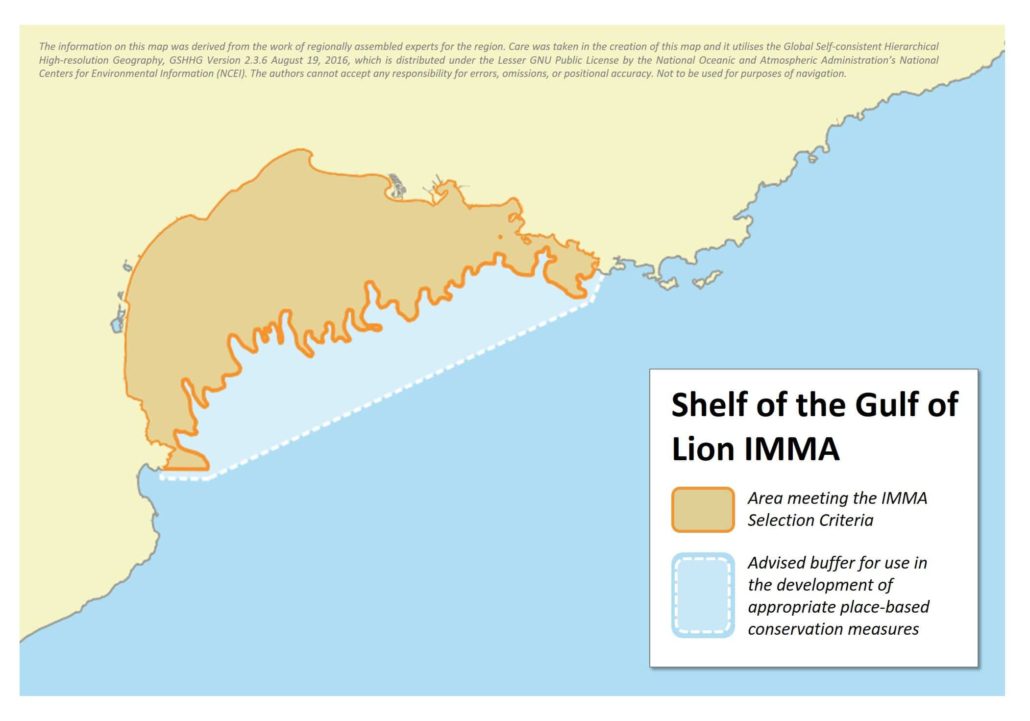Shelf of the Gulf of Lion IMMA
Area Size
13 003 km2
Qualifying Species and Criteria
Common bottlenose dolphins – Tursiops truncatus
Criterion A; C (1, 2)
Marine Mammal Diversity
Balaenoptera physalus, Tursiops truncatus, Stenella coeruleoalba, Grampus griseus, Ziphius cavirostris, Physeter macrocephalus
Download brochure
Summary
The Shelf of the Gulf of Lion is a large shelf along the French coast of the north western Mediterranean Sea. This area contains important habitat for Vulnerable Mediterranean common bottlenose dolphins (Tursiops truncatus). Around 650 individuals live here year-round, feeding, breeding and taking care of their young. This area is enriched by the Rhone river, along with the geostrophic northern Mediterranean current. It is a biogeographic entity of its own and an important Mediterranean fishing ground.
Description of Qualifying Criteria
Criterion A – Species or Population Vulnerability
The IUCN Red List of Threatened Species lists the Mediterranean subpopulation of common bottlenose dolphin as Vulnerable. Photo identification research within the area has identified 834 different individuals, with a 53% recapture success. A mark-recapture analysis provides a population of at least 655 ind. (95% IC: 385 -1095) of common bottlenose dolphins living in the area year-round, whilst amongst them 53.2% are resident.
Criterion C: Key Life Cycle Activities
Sub-criterion C1: Reproductive Areas
During the two years of study newborns dolphin were observed all year round, from 5.3% of individuals in summer to 0.7% in winter (from 92 sightings and 1545 individuals). Female and young animals utilise the shelf as a whole, having been seen from one side to the other within a month or more from photo-identification recaptures. These results come from a two-year study, made in 2013-2015 and focusing on the whole shelf of the Gulf of Lion for this species.
Sub-criterion C2: Feeding Areas
In 38.5% of all 92 sightings made, animals were actively engaged in feeding activities, with animals observed to feed across all seasons. Also, they are known to interact with bottom trawlers. These come from a two-year study, made in 2013-2015 and focusing on the whole shelf of the Gulf of Lion for this species.
Supporting Information
Di-Méglio, N., Roul, M., David, L., Gimenez, O., Azzinari, C., Jourdan, J., Barbier, M. et Labach, H. 2015. Abondance et répartition spatio-temporelle et fonctionnelle du Grand dauphin dans le Golfe du Lion. Projet GDEGeM Grand Dauphin Etude et Gestion en Méditerranée 2013-2015. Rapport GIS3M, fait par EcoOcéan Institut, BREACH et le GECEM. 79 p.+ 9p annexes
Labach, H., Gimenez, O., Barbier, M., Jourdan, J., David, L., Di-Méglio, N., Roul, M., Azzinari, C., Robert, N. et Tomasi, N., 2015. Etude de la population et de la conservation du Grand Dauphin en Méditerranée française. Projet GDEGeM Grand Dauphin Etude et Gestion en Méditerranée 2013-2015. Rapport GIS3M. 54 p. + annexes
Laran, S., Pettex, E., Authier, M., Blanck, A., David, L., Doremus, G., Falchetto, H., Monestiez, P., Van Canneyt, O. at Ridoux, V. (2016). Seasonal distribution and abundance of cetaceans within French waters: Part I: How many they are in the northwestern Mediterranean Sea (including the Pelagos Sanctuary)? Deep Sea Research. Part II,
http://dx.doi.org/10.1016/j.dsr2.2016.12.012
Renaud, A., 2001. Le Grand dauphin (Tursiops truncatus), une espèce de la Directive Habitats dans le Golfe du Lion: évolution des populations, perception par les différents publics, réflexion critique sur les stratégies de conservation. Ecole Pratique des Hautes Etudes – Montpellier
Ripoll, T., Dhermain, F., Barril, D., Roussel, E., David L., and Beaubrun, P., 2001. First summer population estimate of Bottlenose dolphins along the Mediterranean french coasts. Eur. Research on Cetacean 15, Rome (Italie), 6-10 May 2001: 393-396.
Downloads
Download the full account of the Shelf of the Gulf of Lion IMMA using the Fact Sheet button below:
To make a request to download the GIS Layer (shapefile) for the Shelf of the Gulf of Lion IMMA please complete the following Contact Form:


